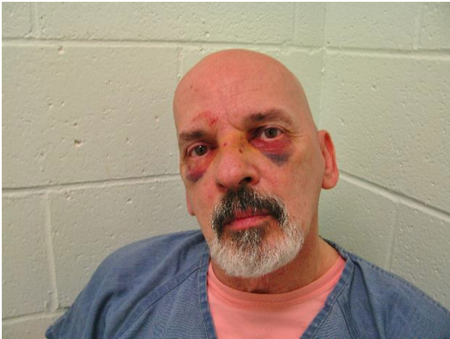A federal judge on Monday rejected fraud convict Jack Holden’s motion for compassionate release in the wake of the coronavirus pandemic, finding the 79-year-old hadn’t exhausted other administrative steps through the warden of the federal prison in Sheridan.
U.S. District Judge Anna J. Brown said she can’t rule on the merits of Holden’s request until the warden of the prison has 30 days to consider it. Holden has 21 months left on his sentence of seven years and three months for his 2016 conviction on mail and wire fraud, money laundering and conspiracy charges for his role in a fraudulent biodiesel scheme that spanned three continents.
Brown’s decision comes days after two other federal judges in Portland rejected the renewed release requests of three Gypsy Joker Outlaw Motorcycle Club defendants, Earl Deverle Fisher, 50, Joseph Duane Folkerts, 62, and Chad Erickson, 49. All three face racketeering conspiracy charges stemming from the June 2015 torture-style killing and kidnapping of Robert “Bagger” Huggins, 56, in an alleged revenge slaying.
Each argued that they’re also at a heightened risk of becoming ill or dying if they contract the coronavirus while in custody. They described themselves as medically compromised and susceptible to COVID-19.
The judges, though, found that the coronavirus pandemic didn’t change their conclusion that the three men remain a danger to the community and pose a risk of not returning to court if released.
The release requests are among a growing number of motions by federal defendants for release in the wake of the coronavirus outbreak.
On Friday, U.S. Attorney General William Barr ordered the Federal Bureau of Prisons to prioritize the early release of some high-risk prisoners to home confinement from federal prisons in Louisiana, Connecticut and Ohio, where inmates or staff have tested positive for the new coronavirus and have died. Federal prisons also last week were placed on lockdown nationwide to help stem the spread of the virus.
In federal prisons across the country, 196 inmates and 63 staff have tested positive for COVID-19.
In Oregon, an inmate from the state Santiam Correctional Institutional in Salem tested positive for COVID-19 and two sheriff’s deputies at the Marion County Jail tested positive.
No one is known to have tested positive for the virus in Oregon’s sole federal prison in Sheridan or in Multnomah County’s jails, prosecutors pointed out.
In Holden’s case, Brown didn’t rule on the merits of his argument that he’s at higher risk of contracting the virus due to his age and poor health.
The judge said she can’t rule on Holden’s motion to reduce his sentence until 30 days has passed since he made a formal request to the prison’s warden, which occurred on either March 24 or 25. Brown said Holden can return to the court once 30 days have passed.
“A defendant seeking a reduction in his terms of imprisonment bears the burden to establish both that he has satisfied the procedural prerequisites for judicial review and that compelling and extraordinary reasons exist to justify compassionate release,’’ Brown wrote in her ruling.
Holden is housed at the federal prison camp at Sheridan in a dormitory setting and the inmates are still released for showers, education and use of the commissary, said his lawyer, Oregon Federal Public Defender Lisa Hay.
Assistant Federal Public Defender Elizabeth Daily, who also argued for Holden’s release, asked the court to excuse the 30-day requirement due to the national emergency. “The 30 days is simply too slow,’’ she said.
But Assistant U.S. Attorney Claire Fay said Holden should “wait his turn’’ by following prescribed procedures. “He’s asking the court to ignore the statute,’’ Fay said. “He wants to jump to the head of the line.’’
Of about 175,000 inmates in federal prison, about 11,000 are 60 years or older, Fay said. She said there are most likely other inmates awaiting “administrative action who have various health issues that are very dire.’’
Hay said Monday that she was disappointed by Brown’s ruling. The government is “averting their eyes, when we should be trying to avert catastrophe,” Hay said.
“We are examining a possible appeal, but of course this would take time away from our work to assist other vulnerable clients being held at (Bureau of Prison) facilities around the country. We feel we are racing the clock against unwarranted death sentences.”
The denials by U.S. District Judges Michael W. Mosman and U.S. Magistrate Judge Stacie F. Beckerman in the Gypsy Joker cases came last week. Fisher and Folkerts are at the Multnomah County Detention Center; Erickson is at the county’s Inverness Jail.
Prosecutors successfully argued that the coronavirus pandemic didn’t reduce their danger to the community and called each of the defendants’ arguments about the risk of the virus outbreak in jail “speculative at the moment.’’
Fisher pleaded guilty in June to conspiracy to commit racketeering and awaits sentencing. He asked to be released to home detention with electronic monitoring. Since an on-the-job accident in 2007, Fisher is partially paralyzed, blind in one eye and has just one functioning kidney, his lawyers wrote.
Erickson, who suffers from hypertension and diabetes, is housed in “dormitory style,” or “open bed housing” and sleeps only a few feet away from several other inmates, his lawyers argued in court papers. Erickson also shares bathing and dining facilities with dozens of other inmates at the same time, according to his lawyers. Charges remain pending against Erickson.

Folkerts asked how the Multnomah County Sheriff’s Office, which couldn’t protect him from an assault behind bars, could keep him safe from the coronavirus.
On Feb. 21, Folkerts was attacked without provocation while eating lunch in a common area of the Inverness Jail and suffered severe bruising and a possible fractured nose, according to his lawyers. Folkerts suspects, they said, that other inmates wrongly perceived and identified him as a cooperating witness in the Gypsy Jokers case.
His accused attacker, Anthony Kronus Swift, co-founder of a violent prison and street gang known as the “The Brood,’’ or “Rude Krude Brood,” appears to have targeted Folkerts, Folkerts’ lawyers said. Members of “The Brood” have in recent years “provided muscle-for-hire to outlaw motorcycle clubs,’’ according to the Southern Poverty Law Center, Folkerts’ lawyers pointed out.
Folkerts suffered severe bruising and a possible fractured nose, according to his lawyers.
After the assault, Folkerts asked to be placed in protective custody and was moved to the downtown jail, where he is allowed out of his cell for only 2 to 2 ½ hours a day and then is in close contact with three to eight other inmates who often are coming from or returning to other jails, his lawyers said. Folkerts suffers from hypertension and post-traumatic stress disorder, they said.
Assistant U.S. Attorney Leah Bolstad countered that Folkerts was beaten because he and other inmates were trying to get Swift removed from the jail because of his “odd behavior, ” and there was no evidence Swift targeted Folkerts due to speculation he was a cooperating witness. Folkerts is now housed in his own cell where he’s more isolated and less exposed to germs, the prosecutor said. Charges are also pending against Folkerts.
Bolstad also told the court the Multnomah County Sheriff’s Office has taken steps to safeguard inmates and staff: It opened an additional dorm at Inverness Jail on Friday to allow for better social distancing; has enhanced screening of arriving inmates for coronavirus symptoms and asks them about their travel and contact history; and has staff clean more frequently.
The defendants’ lawyers all argued that those measures aren’t sufficient.
“It is impossible in the jail to follow the guidelines promulgated by medical professions to keep 6 feet apart, to wash one’s hands regularly, to wear face coverings or to self-quarantine after exposure,’’ Lynne B. Morgan, one of Fisher’s lawyers, wrote to the court.
You can discuss this material in our Facebook group!
Source: The Oregonian
